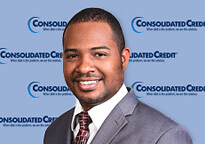What’s the most common reason clients give for being in debt?
“Job loss or poor money management,” he says. “People want things now and like the idea of paying later. For instance, a new phone is coming out, and they may not need it, but because the company added two megapixels to the camera, they think it’s worth it. Even though the previous generation is just as good, they get rid of theirs and upgrade. If they had to put their life savings into it, they probably would put more value into things. Sometimes we find ourselves buying things we don’t need.”
What advice do you have for people who fall victim to the instant-gratification phenomenon?
“Write down everything you are spending on and keep a budget,” he advises. “Often we don’t know where our money is going. We go around with our credit card swiping and then we end up in the negative because we didn’t keep a record of what we were spending on.”
Richard uses a scenario:
“A lot of people keep a mental record, which is not always best. You may have spent $300 on your car that you didn’t record, then go to Starbucks to get a $5 coffee and get declined. They may go to the ATM see that they have a balance of $300 but didn’t notice that they have a pending transaction for $250. They then go and spend that $250 and end up in the negative and get upset because of the fees.”
What’s the nicest thing a graduate from the program has ever said to you?
“You guys are the best thing that has happened to my life. I feel completely free! I value money now and can enjoy my savings like never before. I can now retire so I’m going to travel the world.”
What do your friends and family think about your job and what were your thoughts about debt consolidation prior to working here?
“They feel like I have learned a lot and I have taught them good ways of saving money and valuing money. I didn’t really know the concept of debt consolidation before. I had only heard of bankruptcy – you don’t have money, you file bankruptcy that’s it. I now know there are other options.”
Bankruptcy is not always the best solution and it might take you some time to recover. Debt management, on the other hand, may be a better option in some cases.
How do you separate your work life from your personal?
“I try not to take them home but I do have stories that stick in my mind,” he admits. I’ve learned that some people appreciate it more when you listen to them, than what you have to say to them. Even if they don’t follow the advice, at least they get some peace of mind. There’s a lesson to be learned in all my calls. If some of the scenarios were to play out in my life in the future I’d know what to do. They also help me help other clients”
What advice would you like to give people out there?
“Don’t max out your credit card. Pay close attention to your interest, and if the interest changes, call the creditor right away and try to get back on the original interest rates. If the interest is higher than the minimum payment, pay off the card and then close them.”
But Richard says if you’re already drowning in debt, Consolidated Credit can help.
“If you have too many credit cards and can’t manage, or if you’re already maxed out and can’t afford a monthly payment, if the creditors are not willing to lower the payment or the interest rates, seek other avenues like Consolidated Credit.”
Don’t let keeping up with debt drive you insane
Keeping track of multiple due dates on multiple credit cards can be overwhelming. If controlling your finances and credit cards are proving difficult to manage seek help. Our certified credit counselors can help you craft a budget to track your spending. Call Consolidated Credit at (844) 276-1544 or request a free Debt & Budget Analysis online.
